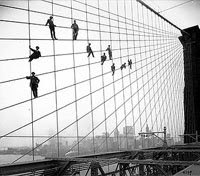"Creative Destruction" -- Whose creation? Whose destruction?
 ________________________
________________________ Too Big Not To Fail We need to stop using the bailouts to rebuild gigantic financial institutions.
The great irony is that our new place in the global economy is a direct consequence of our grand victory over the past 60 years. We have, indeed, converted virtually the entire world into one integrated capitalist economy, and we must now bear the brunt of serious and vigorous competition. In the immediate aftermath of World War II, the United States was essentially the only nation with financial capital, intellectual capital, skilled labor, a growing middle class generating consumer demand, and a rule of law permitting safe investment. Now we are one of many nations with these critical advantages.
This long-term change frames the question we should be asking ourselves: What are we getting for the trillions of dollars in rescue funds? If we are merely extending a fatally flawed status quo, we should invest those dollars elsewhere. Nobody disputes that radical action was needed to forestall total collapse. But we are creating the significant systemic risk not just of rewarding imprudent behavior by private actors but of preventing, through bailouts and subsidies, the process of creative destruction that capitalism depends on. . . .
It is time we permitted the market to work: This means true competition with winners and losers; companies that disappear; shareholders and CEOs who can lose as well as win; and government investment in the long-range competitiveness of our nation, not in a failed business model of financial concentration and failed risk management that holds nobody accountable.
I hate it when I have to dig out well reasoned arguments in opposition to the policies I support. But I do like the historical analysis of the first paragraph. This is what made the U. S. smug and satisfied. And now we all pay the price for that smugness and self-satisfaction. My problem is in that “all” blanket punishment thing.
Do you notice one thing about this analysis that is missing? Where are the working class types that went along for the ride? That last paragraph about “It is time we permitted the market to work” has nary a mention of the workers who regularly punched the clock, did the jobs they were told to do, and tried to make the best world possible for their families. The winners and losers mentioned here are companies, shareholders and CEOs–plenty of responsibility there.
But where are the real “Joe the Plumbers,” not the McCain-Palin inflatable doll type Joes, in all of this? Missing, forgotten, unimportant, not worthy of consideration or help?
I never fail to be saddened by working class people who take out their frustrations with “the system” on other working class people–neighbors and relatives who have about as much to do with the failings and greedy excesses of “the system” as a passenger sitting in the back of the plane has to do with the course chosen by the pilot or bringing that plane down to a safe landing.
Criticize CEO pay packages or tax cuts for the rich and conservative neon billboards are immediately switched on: CLASS WARFARE! LOSER ENVY! is the glaring response. Attempt to save the comparative pittance of wages, benefits, dignity and respect built up over a life time of work and union organizing and the UAW is attacked as some kind of gangster cartel. Now that’s what I call LOSER ENVY. Too bad so many of the losers live on the same block as those who had the smarts and the guts to join unions.
If you find the analysis in the excerpt above to your liking, the entire column is HERE .
By the way, the author of this thought provoking piece is Elliott Spitzer. Please note for future reference how Spitzer's personal life was not dragged out in order to put his argument in an irrelevant shadow.


0 Comments:
Post a Comment
<< Home